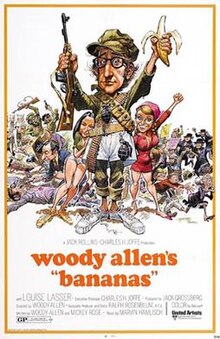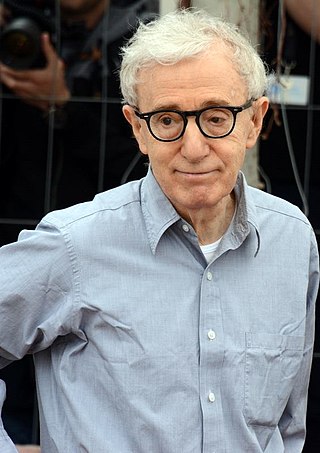
Heywood Allen is an American filmmaker, actor, and comedian whose career spans more than six decades. Allen has received many accolades, including the most nominations (16) for the Academy Award for Best Original Screenplay. He has won four Academy Awards, ten BAFTA Awards, two Golden Globe Awards and a Grammy Award, as well as nominations for a Emmy Award and a Tony Award. Allen was awarded an Honorary Golden Lion in 1995, the BAFTA Fellowship in 1997, an Honorary Palme d'Or in 2002, and the Golden Globe Cecil B. DeMille Award in 2014. Two of his films have been inducted into the National Film Registry by the Library of Congress.

Annie Hall is a 1977 American satirical romantic comedy-drama film directed by Woody Allen from a screenplay written by Allen and Marshall Brickman, and produced by Allen's manager, Charles H. Joffe. The film stars Allen as Alvy Singer, who tries to figure out the reasons for the failure of his relationship with the eponymous female lead, played by Diane Keaton in a role written specifically for her.

Manhattan is a 1979 American romantic comedy-drama film directed by Woody Allen and produced by Charles H. Joffe from a screenplay written by Allen and Marshall Brickman. Allen co-stars as a twice-divorced 42-year-old comedy writer who dates a 17-year-old girl but falls in love with his best friend's mistress. Meryl Streep and Anne Byrne also star.

Interiors is a 1978 American drama film written and directed by Woody Allen. It stars Kristin Griffith, Mary Beth Hurt, Richard Jordan, Diane Keaton, E. G. Marshall, Geraldine Page, Maureen Stapleton, and Sam Waterston.

Private Benjamin is a 1980 American comedy film directed by Howard Zieff, written by Nancy Meyers, Charles Shyer, and Harvey Miller, and starring Goldie Hawn, Eileen Brennan, and Armand Assante.

Take the Money and Run is a 1969 American mockumentary crime comedy film directed by Woody Allen. Allen co-wrote the screenplay with Mickey Rose and stars alongside Janet Margolin. The film chronicles the life of Virgil Starkwell, an inept bank robber.
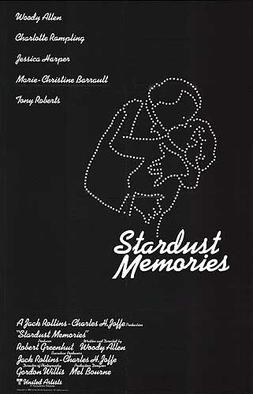
Stardust Memories is a 1980 American comedy-drama film written and directed by Woody Allen, who stars alongside Charlotte Rampling, Jessica Harper, Marie-Christine Barrault, and Tony Roberts. Sharon Stone has a brief role, in her film debut. It follows a filmmaker who recalls his life and his loves—the inspirations for his films—while attending a retrospective of his work. The film is shot in black and white and is reminiscent of Federico Fellini's 8½ (1963), which it parodies.

Sleeper is a 1973 American science fiction comedy film directed by and starring Woody Allen, who co-wrote it with Marshall Brickman. Parodying a dystopic future of the United States in 2173, the film involves the misadventures of the owner of a health food store who is cryogenically frozen in 1973 and defrosted 200 years later in an ineptly led police state. Contemporary politics and pop culture are satirized throughout the film, which includes tributes to the classic comedy of Buster Keaton, Harold Lloyd, and Charlie Chaplin. Many elements of notable works of science fiction are also paid tribute to, or parodied.
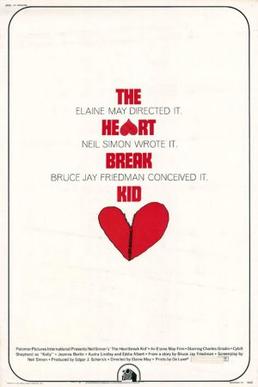
The Heartbreak Kid is a 1972 American romantic black comedy film directed by Elaine May and written by Neil Simon, starring Charles Grodin, Cybill Shepherd, Jeannie Berlin, Audra Lindley, Eddie Albert, and Doris Roberts. It is based on the short story "A Change of Plan", written by Bruce Jay Friedman and first published in Esquire in 1966.

Real Life is a 1979 American comedy film starring Albert Brooks, who also co-authored the screenplay alongside Monica Johnson and Harry Shearer. It is a spoof of the 1973 reality television program An American Family and portrays a documentary filmmaker named Albert Brooks who attempts to live with and film a dysfunctional family for one full year.
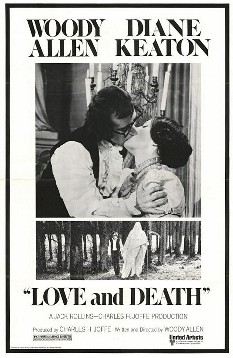
Love and Death is a 1975 American comedy film written and directed by Woody Allen. It is a satire on Russian literature starring Allen and Diane Keaton as Boris and Sonja, Russians living during the Napoleonic Era who engage in mock-serious philosophical debates. Allen considered it the funniest film he had made up until that point.

What's Up, Tiger Lily? is a 1966 American comedy film directed by Woody Allen in his feature-length directorial debut.

The Prisoner of Second Avenue is a 1975 American black comedy film written by Neil Simon, directed and produced by Melvin Frank and starring Jack Lemmon and Anne Bancroft. Neil Simon adapted the screenplay from his 1971 Broadway play.

Norwood is a 1970 American comedy film that reunites True Grit co-stars Glen Campbell and Kim Darby, also featuring Joe Namath. It was based on the novel of the same title, written by Charles Portis, but updated from the original 1950s setting to 1970.
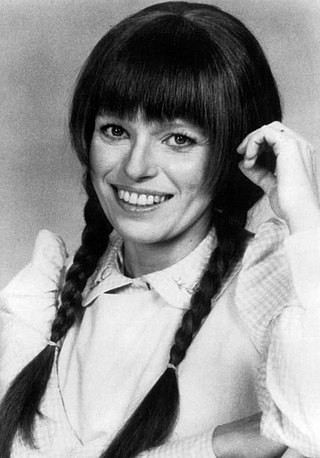
Louise Lasser is an American actress, television writer, and performing arts teacher and director. She is known for her portrayal of the title character on the soap opera satire Mary Hartman, Mary Hartman, for which she was Primetime Emmy Award nominated.
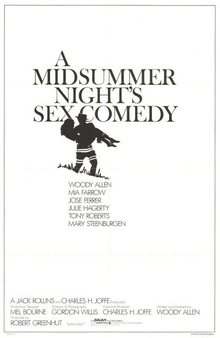
A Midsummer Night's Sex Comedy is a 1982 American sex comedy film written and directed by Woody Allen, starring Allen and Mia Farrow.

Play It Again, Sam is a 1972 American comedy film written by and starring Woody Allen, based on his 1969 Broadway play of the same title. The film was directed by Herbert Ross, instead of Allen, who usually directs his own written work.

Start the Revolution Without Me is a 1970 British-French-American period comedy film directed by Bud Yorkin, and starring Gene Wilder, Donald Sutherland, Hugh Griffith, Jack MacGowran, Billie Whitelaw, Orson Welles and Victor Spinetti. The film is set in revolutionary France where two peasants are mistaken for the famous Corsican Brothers. The film is considered a parody of a number of works of historical fiction about the French Revolution and French history in general, including A Tale of Two Cities (1859) by Charles Dickens and two works by Alexandre Dumas, The Corsican Brothers (1844) and The Man in the Iron Mask (1847).
Carlos Montalbán y Merino was a Mexican character actor.

The Out-of-Towners is a 1970 American comedy film written by Neil Simon, directed by Arthur Hiller, and starring Jack Lemmon and Sandy Dennis. It was released by Paramount Pictures on May 28, 1970. The film centers on the many troubles George and Gwen Kellerman encounter as they travel from their home in suburban Ohio to New York City, where George, a sales executive, has a job interview.
